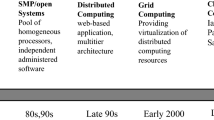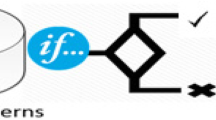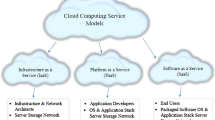Abstract
The future of information technology mainly depends upon cloud computing. Hence security in cloud computing is highly essential for the consumers as well as the service providers of the particular cloud environment. There are many security threats are challenging the current cloud environment. One of the important security threat ever in cloud environment is considered to be the Distributed Denial of Service (DDoS) attack. Where cloud is of greater benefit in terms of providing on-demand services, a certain kind of attack named as Economic Denial of Sustainability (EDoS) occurs in pay per use payment model. Due to the occurrence of this attack the consumers are forced to pay additional amount for the services offered. EDoS attacks are similar to that of DDoS attacks Which is classified as-attacks associated with bandwidth consuming, application targeted attacks and the exhaustion of the connection layer. The main objective of the proposed work is to design a profile-based novel framework for maximizing the detection of various types of EDoS attacks. During this process, the proposed framework consisting Feature Classification (FC) algorithm ensures that false positives and negatives along with bandwidth and memory consumption are highly minimized. The proposed algorithm allows only the limited resources for allocation to the available virtual machines which increases the chances of the detecting the attack and preventing the misuse propagation of resources. The accuracy and efficiency of this approach is proven to be higher with lesser computational complexity when compare to the existing approaches.




Similar content being viewed by others
References
Saleh, M. A. & Manaf, A. A. (2015) A novel protective framework for defeating HTTP-based denial of service and distributed denial of service attacks. The Scientific World Journal, 2015, Article ID 238230, 19. https://doi.org/10.1155/2015/238230
Abbasi, H., Ezzati-Jivan, N., Bellaiche, M., et al. (2019). Machine learning-based EDoS attack detection technique using execution trace analysis. Journal of Hardware Systems and Security, 3, 164–176. https://doi.org/10.1007/s41635-018-0061-2.
Shamshirband, S., Fathi, M., Chronopoulos, A. T., Montieri, A., Palumbo, F., & Pescapè, A. (2020). Computational intelligence intrusion detection techniques in mobile cloud computing environments: Review, taxonomy, and open research issues. Journal of Information Security and Applications, 55, 102582. ISSN 221-2126. https://doi.org/10.1016/j.jisa.2020.102582.
Monge, M. A. S., Vidal, J. M., & Pérez, G. M. (2019). Detection of economic denial of sustainability (EDoS) threats in self-organizing networks. Computer Communications, 145, 284–308. ISSN 0140-3664. https://doi.org/10.1016/j.comcom.2019.07.002.
Abualigah, L. M., Khader, A. T., & Hanandeh, E. S. (2018). Hybrid clustering analysis using improved krill herd algorithm. Applied Intelligence, 48, 4047–4071. https://doi.org/10.1007/s10489-018-1190-6.
Agrawal, N., & Tapaswi, S. (2019). Defense mechanisms against DDoS attacks in a cloud computing environment: State-of-the-art and research challenges. In IEEE Communications Surveys & Tutorials, Vol. 21, no. 4, pp. 3769–3795, Fourthquarter 2019. https://doi.org/10.1109/COMST.2019.2934468.
Kushwah, G. S., & Ali, S. T. (2019). Distributed denial of service attacks detection in cloud computing using extreme learning machine. International Journal of Communication Networks and Distributed Systems (IJCNDS), 23(3), 328.
Virupakshar, K. B., Asundi, M., Channal, K., Shettar, P., Patil, S., & Narayan, D. G. (2020). Distributed Denial of Service (DDoS) attacks detection system for OpenStack-based private cloud. Procedia Computer Science, 167, 2297–2307. ISSN 1877-0509. https://doi.org/10.1016/j.procs.2020.03.282.
Dong, S., Abbas, K., & Jain, R. (2019). A survey on Distributed Denial of Service (DDoS) attacks in SDN and cloud computing environments. IEEE Access, 7, 80813–80828. https://doi.org/10.1109/ACCESS.2019.2922196.
Karan, B. V., Narayan, D. G., & Hiremath, P. S. (2018). Detection of DDoS attacks in software defined networks. In 2018 3rd International Conference on Computational Systems and Information Technology for Sustainable Solutions (CSITSS), Bengaluru, India, pp. 265–270. https://doi.org/10.1109/CSITSS.2018.8768551.
Huancayo Ramos, K. S., Sotelo Monge, M. A., & Maestre Vidal, J. (2020). Benchmark-based reference model for evaluating botnet detection tools driven by traffic-flow analytics. Sensors, 20, 4501.
Rathore, S., & Park, J. H. (2018). Semi-supervised learning based distributed attack detection framework for IoT. Applied Soft Computing, 72, 79–89.
Abualigah, L. M., Khader, A. T., & Hanandeh, E. S. (2018). A new feature selection method to improve the document clustering using particle swarm optimization algorithm. Journal of Computational Science, 25, 456–466. ISSN 1877-7503. https://doi.org/10.1016/j.jocs.2017.07.018.
Pelloso, M., Vergutz, A., Santos, A., et al. (2018). A self-adaptable system for DDoS attack prediction based on the metastability theory. In 2018 IEEE Global Communications Conf. (GLOBECOM), Abu Dhabi, UAE, pp. 1–6.
Xing, J., Zhou, H., Shen, J., et al. (2018). AsIDPS: Auto-scaling intrusion detection and prevention system for cloud. In 2018 25th Int. Conf. on Telecommunications (ICT), Saint Malo, France, pp. 207–212.
Desnoyers, M., & Dagenais, M. (2018). LTTNg: Tracing across execution layers, from the hypervisor to user-space. In Proceedings of the Ottawa linux symposium.
Alger, L. (2018). DDoS attackers increasingly abuse public cloud services (11 September 2018). https://www.devopsonline.co.uk/ddos-attackers-increasingly-abuse-public-cloud-services/.
Karakaya, G., Galelli, S., Ahipaşaoğlu, S. D., et al. (2016). Identifying (quasi) equally informative subsets in feature selection problems for classification: A max-relevance min-redundancy approach. IEEE Transactions on Cybernetics, 46, 1424–1437.
Monge, M. A. S., Vidal, J. M., & Pérez, G. M. (2019). Detection of economic denial of sustainability (EDoS) threats in self-organizing networks. Computer Communications, 145, 284–308.
Nguyen, T. T. T., & Armitage, G. (2019). A survey of techniques for internet traffic classification using machine learning. IEEE Communications Survey & Tutorials, 10(4), 56–76.
Shon, T., & Moon, J. (2017). A hybrid machine learning approach to network anomaly detection. Information Sciences, 177(18), 3799–3821.
Author information
Authors and Affiliations
Corresponding author
Additional information
Publisher's Note
Springer Nature remains neutral with regard to jurisdictional claims in published maps and institutional affiliations.
Rights and permissions
About this article
Cite this article
Dennis, J.B., Priya, M.S. A Profile-Based Novel Framework for Detecting EDoS Attacks in the Cloud Environment. Wireless Pers Commun 117, 3487–3503 (2021). https://doi.org/10.1007/s11277-021-08280-y
Accepted:
Published:
Issue Date:
DOI: https://doi.org/10.1007/s11277-021-08280-y




